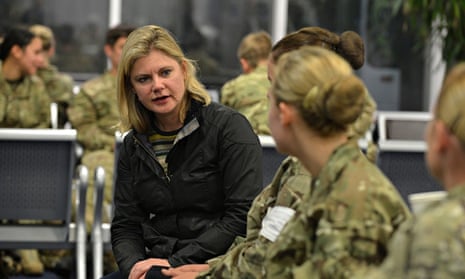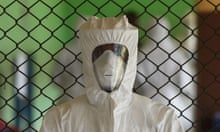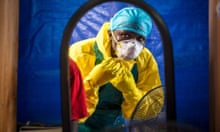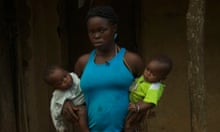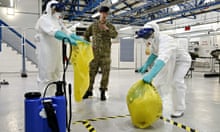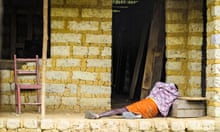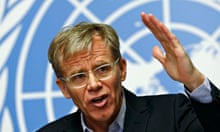We are a network of UK-based organisations and individuals working to improve health in Sierra Leone. The Ebola outbreak is the greatest humanitarian threat the country has faced since its devastating civil war and we welcome the highly committed response to the crisis from both the secretary of state for international development, Justine Greening, and from the UK government as a whole.
To ensure as much benefit is gained from these commitments as possible, we the undersigned members and friends of the UK-Sierra Leone Health Partners Network would like to bring to the UK government’s attention our following concerns, and call upon the secretary of state for international development to raise them further with relevant cabinet ministers:
First, the withdrawal of Gambia Bird flight permits. The decision by the UK government to halt direct flights between London and Freetown was ill advised and contradicts travel advice from the WHO and the Foreign Office. Forcing people from the UK to travel to west Africa via Europe significantly impedes efforts to deliver humanitarian aid and monitor returning travellers. This knee-jerk response is putting UK nationals on the ground at risk by leaving them under-equipped and understaffed, putting our own population at greater risk by undermining efforts to tackle Ebola at its source, and having a devastating impact on the Sierra Leonean economy. We call upon the UK government to reinstate direct flights between the UK and Sierra Leone.
Second, slow scale-up of bed numbers and coverage. A recent paper in The Lancet claimed we face a “rapidly closing window of opportunity for controlling the outbreak and averting a catastrophic toll of Ebola cases and deaths”. The 1,700 beds pledged by the US to Liberia are less than half the 4,800 required by mid-November to rapidly control the disease, and requirements rise exponentially as each week passes. The large treatment centres being built in permanent structures by the UK in Sierra Leone are essential, but alone are insufficient as they are time-consuming to erect and offer limited coverage. The deployment of low-tech treatment centres in local areas is the only way to achieve the rapid scale-up of capacity required. We understand the UK is beginning to adopt this approach which is encouraging, but much more needs to be done to avoid further catastrophic loss of life. We call upon the UK government to increase the use of low-tech facilities in local areas.
Third, expensive transportation costs. Many of our network organisations, including diaspora groups and charities, have significant resources at their disposal that they struggle to deliver because of extortionate logistical costs. The UN office for the coordination of humanitarian affairs can provide a cost-effective and efficient humanitarian relief supply chain via companies such as DHL when called upon to act by member states. This has yet to be done and is a significant barrier to relief efforts. We call upon the UK government to lobby the UN to provide logistical support for the delivery of humanitarian aid.
Fourth, fragile health systems. This unprecedented outbreak is the result of a “perfect storm” of several underlying conditions, the most critical of which is the weakness of local health systems. Sierra Leone has about 120 doctors for 6 million people. The UK has supported ambitious government health reforms in the past and impressive progress has been made, but Ebola has pushed the health system to breaking point. Unless a comprehensive response to this crisis is adopted, health services will collapse entirely, resulting in a public health disaster that will eclipse the Ebola outbreak itself and provide the perfect incubator for further outbreaks. As the leader of the international response in Sierra Leone, the UK must ensure the unprecedented international attention and resources support long-term efforts to strengthen all aspects of the health system, in collaboration with the Sierra Leonean Ministry of Health and Sanitation. We call upon the UK government to support long-term, sustainable efforts to strengthen Sierra Leone’s health system to avert an impending public health disaster.
Dr Oliver Johnson
King’s Sierra Leone Partners
Sir James Mellon
Former high commissioner of the UK to Ghana, Vice-president, St Andrew’s Clinic for Children (STACC)
Professor John Rees
Emeritus professor of medical education, King’s College London
Professor David Lloyd
Chair, The Waterloo Partnership, Emeritus professor, University of Liverpool, Past-president, British Association of Paediatric Surgeons
Professor Peter Holmes
Emeritus professor, University of Glasgow, Chair, St Andrew’s Clinic for Children (STACC)
Professor David Crompton
Emeritus professor, University of Glasgow
Ade Daramy
Chair, UK Sierra Leone Ebola Taskforce
David M Holmes
Retired chair, Kambia-Gloucestershire Hospitals NHSFT Link
Dr Danny McLernon-Billows
Coordinator, UKSLHP
Edward Blandford
Coordinator, UKSLHP
Dr Edward Cole
Chair, Masanga Hospital International Board, CEO, Sierra Leone Adventists Abroad
Elizabeth Conteh
Chair, The Organisation of Sierra Leonean Health Professionals Abroad
Geoff Eaton
Trustee, Masanga UK
Jacqui Boulton
Co-founder and trustee, UK Friends of The Shepherds Hospice, Sierra Leone
Dr Mary Hodges
Vice-president, St Andrews Clinic for Children-Sierra Leone
Dr Matthew Clark
Co-founder, Welbodi Partnership
Ralph Swann
Coordinator, UKSLHP
Richard Kerr-Wilson
Trustee, Kambia Appeal
Robin Gray
Hon sec, Hastings Sierra Leone Friendship Link
Ruth Cecil
Chair, UK Friends of the Shepherd’s Hospice, Sierra Leone
Shona Lockyer
Chair of trustees, The Kambia Appeal
Mark Whitby
President of board of trustees, The Construction and Development Partnership, SL
Valerie Tucker
Country manager, IPAS Sierra Leone
Amar Nathwani
UKSLHP member
Amelia Cook
Medical student, King’s College London
Anne Barry
Surgical practitioner, Hinchingbrooke NHS Trust
Caroline Baker
Options Consultancy Services Ltd
Christine Boulton-Lane
Hastings Sierra Leone Friendship Link
Emily Bell
Programme manager, Sound Seekers, UCL Ear Institute
Darsha Patel
UKSLHP member
Dr Frederick Nye
UKSLHP member
Gemma Cook
Physiotherapy coordinator, King’s Sierra Leone Partnership
Jagruti Patel
Trustee, Better Lives Foundation
Jamie Patel
IT consultant
Jenifa Jeyakumar
UKSLHP member
Kantilal Mistry
UKSLHP member
Katrina Hann
Research consultant, Sierra Leone
Komal Patel
Senior clinical pharmacist, NHS
Krushna Patel
Pharmacy assistant
Mathew Bartley
Director, BartleyHealth Ltd
Max Manning-Lowe
Administrator, King’s Sierra Leone Partnership
Nainesh Patel
Lead pharmacist, Better Lives Foundation
Dr Natalie Gulliver
King’s Sierra Leone Partnership
Dr Natalie Nairi Quinn
Career development fellow in economics, University of Oxford
Dr Peter Baker
Public health speciality registrar, Volunteer epidemiologist for King’s Sierra Leone Partnership
Ronald G Smith
Retired fellow, American College of Dentists, International Association of Oral Maxillofacial Surgery
Sara Nam
Technical specialist reproductive and sexual health, Options Consultancy Ltd
Dr Shona Johnston
Paediatric registrar and VSO volunteer
Sneha Baljekar
Nursing student, King’s College London
Dr Tom Pearson
General practitioner, NHS
Tushar Trivedi
Pharmacist, Better Lives Foundation
Uriben Patel
UKSLHP member
Vanessa Adams
South Wales-Sierra Leone Cancer Care
Yoges Yogendran
UKSLHP member
